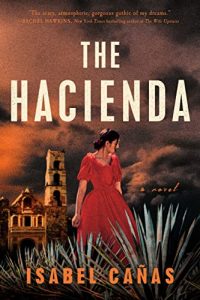Maya C. James Reviews The Hacienda by Isabel Cañas
 The Hacienda, Isabel Cañas (Berkley 978-0593436691, 352pp, $27.00, hc) May 2022. Cover by Vi-An Nguyen.
The Hacienda, Isabel Cañas (Berkley 978-0593436691, 352pp, $27.00, hc) May 2022. Cover by Vi-An Nguyen.
The Hacienda by Isabel Cañas is a gothic horror set in the recent aftermath of the Mexican War of Independence. After her father was murdered and their house burned down, Beatriz marries the wealthy Rodolfo to inherit his estate, and move her mother away from their cruel aunt and uncle. Upon her arrival, it quickly becomes apparent that something is deeply wrong with the hacienda – walls fall apart, blood drips down walls, and cold hands lie waiting to push unsuspecting inhabitants down its stairs and into its stucco walls. Everyone seems to know about the danger of the home, but no one in the hacienda will help her. Her mother will not even return her letters.
Desperate for help, Beatriz turns to the local church, where she meets Padre Andrés, a witch turned priest, and begs him to help her rid the house of its evil presence. Despite the watchful eye of the church, and memories of the Mexican Inquisition’s torture of people like him, Andrés agrees, invoking the knowledge his grandmother bestowed upon him to save the house he once was familiar with. But even his generational knowledge pales in comparison to the wrath of the hacienda.
There’s a clear timeline for Beatriz to solve the haunting. San Isidro is hers, no matter who or what tries to take it from her, and she must prove herself to her mother before her arrival. Her only other options are to return to the capital, where she would have to dine and socialize with the women whose families executed her father. She has a distinct stubbornness that’s needed to stay in a house as evil as Hacienda San Isidro – her fear of humiliation, rather than altruism, make for a far more compelling narrative: she does not stay in Apan to rescue anyone, even if this begins to motivate some of her actions later on in the novel. Rather, she stays because she refuses to be made small and down-trodden ever again. Cañas plays with the theme of sanctuary turned prison. Between societal expectations, the realities of war, and her father’s politics, Beatriz doesn’t realize she’s in over her head until it’s become too late and too dangerous to leave.
Set in the town of Apan, Cañas adeptly weaves together detailed layers of Mexican history and religious complexities into Beatriz’s own tale. Moving between a first-person perspective of Beatriz and Andrés, readers become accustomed to the complexities of the small town, and the handsome stranger Beatriz married. As Beatriz reveals more of her life to the women in the hacienda, we gain more respect for their survival, and the strength to go on after death ravages the living and invokes the dead.
Categorized as a mix between Rebecca and Mexican Gothic, there’s plenty of spooky house corners and romantically-fueled drama to keep the pages turning. What piqued my interest were the subtle references to the ghost of colonial violence and the impact that war has on generations to come. Heavy with the scent of copal and blood, The Hacienda is soaked in a foreboding sense of impending spiritual and physical violence. Graves are freshly dug, gardens decay, and houses absorb the feelings and fears of their inhabitants. Cañas’s wordplay within and outside metaphor maintain this brooding sense of impending doom, even in moments of relative calm. The relentless danger persists on each page. Readers know that Beatriz is walking into danger, and we know she cannot leave.
Cañas also writes of rage elegantly. I enjoyed the fierce stubbornness and determination of the women in the story. Their complexity, even if uneven at times, was nicely juxtaposed with the unchecked violence of the men surrounding them. As Beatriz learns more of the man she married, she becomes fearful that anyone and anything can hurt her. Some characters were far more compelling than others; Juana, sister of Beatriz’s husband Rodolfo, became less complex as the novel progressed. I would have loved to learn more about Juana’s anger, and see Cañas tie up some other plot threads. Beatriz’s father, for example, seems to exist in bits and pieces of her life, but fades away as time goes on, despite her traumatic witnessing of his death. While there is some closure about her other relationships, I found myself selfishly wanting more understanding of what drove characters into murderousness and hatred.
Maya C. James is a graduate of the Lannan Fellows Program at Georgetown University, and full-time student at Harvard Divinity School. Her work has appeared in Star*Line, Strange Horizons, FIYAH, Soar: For Harriet, and Georgetown University’s Berkley Center Blog, among others. She was recently long listed for the Stockholm Writers Festival First Pages Prize (2019), and featured on a feminist speculative poetry panel at the 2019 CD Wright Women Writer’s Conference. Her work focuses primarily on Afrofuturism, and imagining sustainable futures for at-risk communities. You can find more of her work here, and follow her on Twitter: @mayawritesgood.
This review and more like it in the June 2022 issue of Locus.
 While you are here, please take a moment to support Locus with a one-time or recurring donation. We rely on reader donations to keep the magazine and site going, and would like to keep the site paywall free, but WE NEED YOUR FINANCIAL SUPPORT to continue quality coverage of the science fiction and fantasy field.
While you are here, please take a moment to support Locus with a one-time or recurring donation. We rely on reader donations to keep the magazine and site going, and would like to keep the site paywall free, but WE NEED YOUR FINANCIAL SUPPORT to continue quality coverage of the science fiction and fantasy field.
©Locus Magazine. Copyrighted material may not be republished without permission of LSFF.






